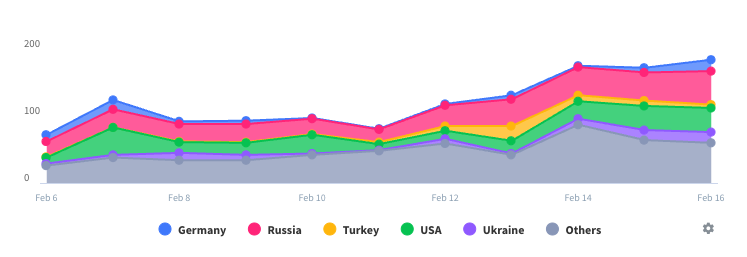
Sistema Museale Valle Trompia
Published by:
j'eco Srl

Description
The Valle Trompia Museum System was established in 2000 by the Valle Trompia Mountain Community and became the Permanent Institute of Culture in 2009 following obtaining the recognition granted by the Lombardy Region. To date, ten locations and museum collections formally adhere to the System. Added SIBCA - the Integrated System of Cultural Heritage of the Valley and in synergy with the Library-Archival System and the Ecomuseum of Valle Trompia. The Mountain and Industry, the Museum System works for the enhancement of the cultural heritage of the territory, protecting and promoting collections and tangible and intangible heritages, constantly monitoring them in order to propose an increasingly complete offer of the historical-artistic and ethnographic heritage of the Valley.\r\nThis goal is pursued thanks to the collaboration with the 18 municipalities of the Valley (Bovegno, Bovezzo, Brione, Caino, Collio, Concesio, Irma, Gardone Val Trompia, Lodrino, Lumezzane, Marcheno, Marmentino, Nave, Pezzaze, Polaveno, Sarezzo, Tavernole sul Mella, Villa Carcina), the neighboring municipality of Ome and with various local private realities, with a view to integrating with the tourist and economic aspects of the territory.\r\nPriority remains the enhancement of the culture linked to the mining tradition of the Via del Ferro and Mines, to which 6 out of 10 museums belong, including: the S. Aloisio mine in Collio, the Pezzaze mine museum, the Il Forno di Tavernole museum, the Museum of Arms and Weaponry Tradition in Gardone Valtrompia, the I Magli Museum in Sarezzo and the Borgo del Maglio di Ome with the Maglio Averoldi, flanked by the rural culture linked to the mountains and the Via Del Bosco with the Ethnographic Museum and Casa Contadina di Lodrino, the Costanzo Caim Ethnographic Collection (set up in the Torre di Mondaro in Pezzaze) and the “C. Giancola” Ethnographic Museum in Collio.\r\nThe material assets referable to the historical-artistic-archaeological area of the Via del Sacro and dell'Arte are also conspicuous, such as the ORMA Museum in Pezzaze, the Paolo VI-Contemporary Art Collection in Concesio and the Borgo del Maglio with the Pietro Malossi House Museum.
Hide
Show More...
Screenshots
Sistema Museale Valle Trompia FAQ
-
Is Sistema Museale Valle Trompia free?
Yes, Sistema Museale Valle Trompia is completely free and it doesn't have any in-app purchases or subscriptions.
-
Is Sistema Museale Valle Trompia legit?
Not enough reviews to make a reliable assessment. The app needs more user feedback.
Thanks for the vote -
How much does Sistema Museale Valle Trompia cost?
Sistema Museale Valle Trompia is free.
-
What is Sistema Museale Valle Trompia revenue?
To get estimated revenue of Sistema Museale Valle Trompia app and other AppStore insights you can sign up to AppTail Mobile Analytics Platform.

User Rating
App is not rated in Lebanon yet.

Ratings History
Sistema Museale Valle Trompia Reviews
Store Rankings

Ranking History
App Ranking History not available yet

Category Rankings
App is not ranked yet
Sistema Museale Valle Trompia Installs
Last 30 daysSistema Museale Valle Trompia Revenue
Last 30 daysSistema Museale Valle Trompia Revenue and Downloads
Gain valuable insights into Sistema Museale Valle Trompia performance with our analytics.
Sign up now to access downloads, revenue, and more.
Sign up now to access downloads, revenue, and more.
App Info
- Category
- Travel
- Publisher
-
j'eco Srl
- Languages
- Burmese, English, Italian
- Recent release
- 1.0.1 (1 year ago )
- Released on
- Dec 16, 2022 (2 years ago )
- Also available in
- Nigeria, Ireland, Italy, Japan, South Korea, Kazakhstan, Lebanon, Mexico, Malaysia, Indonesia, Netherlands, Norway, New Zealand, Philippines, Pakistan, Portugal, Romania, Russia, Denmark, Argentina, Austria, Azerbaijan, Belgium, Brazil, China, Colombia, Germany, United Arab Emirates, Spain, Finland, France, United Kingdom, Greece, Hong Kong SAR China, Hungary
- Last Updated
- 2 days ago
This page includes copyrighted content from third parties, shared solely for commentary and research in accordance with fair use under applicable copyright laws. All trademarks, including product, service, and company names or logos, remain the property of their respective owners. Their use here falls under nominative fair use as outlined by trademark laws and does not suggest any affiliation with or endorsement by the trademark holders.



